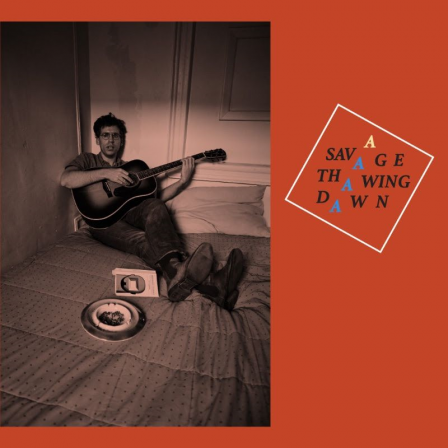Authenticity can be an affectation like any other. The common presupposition goes that music with a more ostensibly traditional grounding is automatically more honest, that the presence of perceived “rootsy” elements (read: slide guitar) augurs a singular kind of artistic vision, one liberated from ponderous boardroom graphs and the specter of surplus-value. The risk of a metropolitan artistry crossing the threshold into more long-established forms is that it can engender a sort of faux-alterity — ancestral energies gasping in the claustrophobic machinery of urban life.
Look at the cover of Thawing Dawn, the first solo album from Brooklyn-based Andrew Savage (here going by the droll diminutive A. Savage). Intentionally drained of color and subtlety, the image depicts Savage splayed on a bed, cradling an acoustic guitar, with a crowded ashtray and an open copy of Modern Moral Philosophy strategically placed to one side. It could seem utterly contrived at first glance — a graceless parody of 1960s Greenwich Village imagism — but such a shallow reading of Savage’s intentions would do him a disservice. As with his approach as front man of Parquet Courts, it’s pure deferral, a proxy hiding something more knotted and complex.
Thawing Dawn finds Savage treading the familiar territory of an urban creative distilling personal and contemporary concerns through an alt-country framework. He takes the bones of Parquet Courts’ scampish post-punk dynamic and adds a Southern garnish; littered throughout are pedal-steel licks and characters right out of a Flannery O’Connor short story. Recorded with a smorgasbord of members from the likes of Woods, PC Worship, Psychic TV, and Ultimate Painting, what Savage has in mind here is something along the lines of Bright Eyes, The Men’s New Moon, or even some of the twangier Pavement cuts: a partially ironic warping of the “country music” aesthetic.
While this isn’t a Parquet Courts album, there are traces of the outfit’s style throughout, as though Savage were trying to take the band’s sardonic characteristics and saturate them in the “never new and never old” atemporality of country & folk. Second track “Eyeballs” is one of the most straightforward, and best, offerings here, an extension of the prismatic grit of Parquet Courts’ exceptional 2016 album, Human Performance. With its rhythmic amble and effervescent guitars, it manages to inoculate the whole Americana thing with some madcap, Lou Reed-ish swagger. “Indian Style” is basically “Instant Disassembly” shorn of its snark, while the febrile arrangements of “Winter In The South” nearly tip into outright honky-tonk, the braying saxophone and swirling electric guitar revealing Savage’s ear for measured disarray. The disparate composition is always calibrated by Savage’s unique vocal style, a drawl you could term “expressively inert.”
Opener “Buffalo Calf Road,” a retelling of the fate of perennial cretin General Custer, drifts along with bucolic instrumentation and apocalyptic poetry: “Water was the sacred power/ That defined the place.” “Phantom Limbo” is where the album leans hardest into that folk-rock heritage, as Savage attempts something like a caliginous reworking of Neil Young’s “Journey Through The Past,” streaked as it is with stirring lines like “There’s a point to life nestled in your eyes when you’re laughing at all my jokes.” At his best, Savage recalls the black-coffee-pungency of fellow Texan Townes Van Zandt — that strange, leathery existentialism with a dustbowl crease.
For all its winking references to country touchstones, Thawing Dawn is most fascinating when Savage is at his most exploratory. The murky crawl of “Ladies From Houston” is a highlight, where a languishing strum stitches together various conversational ephemera. Savage’s vocal is nonchalant, but incisive, sketching tales of freaks and misfits with a Faulknerian bite. He steadily croons through the slowly smoldering “Wild, Wild, Wild Horses,” a feat of minimalist composition with little more than a drone and the occasional disjunctive flash of white noise from the fringe. While “wild horses” as a metaphor has by now been rendered almost trite (I guess Savage is envisaging very wild horses; like three times as wild, at least), here it’s salvaged by Savage’s sheer lyricism. The album is full of poetic flourishes and wry turns of phrase that seem like a vindication of the often straining sincerity of which country music is capable. Now and again, Savage attains a songwriting synthesis reminiscent of the offhand profundity that David Berman used to effortlessly mint on early Silver Jews albums.
“Untitled” is by far the most austere track, with an eerie, ringing organ and vocals that sound both at their most sonically remote and at their most emotionally immediate. This comes before closing title track “Thawing Dawn,” which canters with syncopated drums and a balmy melody. It’s a graceful finish, all sumptuous piano and an asymmetrical acoustic interlude that has the hazy character of a half-formed memory.
While this “Slouching toward Brooklyn” methodology is by no means new, when relayed through a talent like Savage’s, it sounds as though it is: the instrumental aporia is sharp, the experimentalism disciplined. Even the more unabashedly romantic moments somehow sidestep how uniquely taxing it can be to a listen to a dude talk about how he’s in love. Captivating an audience with a first solo effort is a difficult trick to pull off, but Savage has here produced something genuinely absorbing. Sometimes authenticity is just refashioned audacity — in this case, harnessing those hauntological tremors and making them work in your favor.
More about: A. Savage, Parquet Courts




